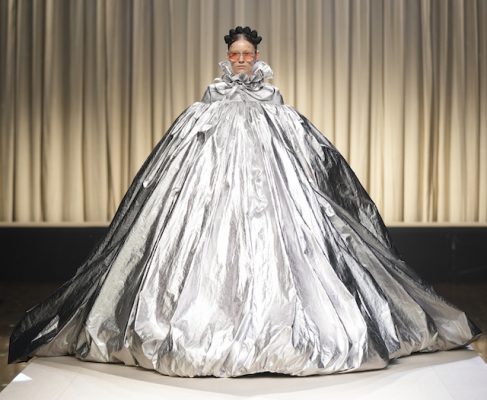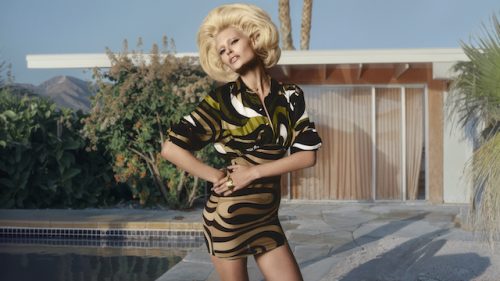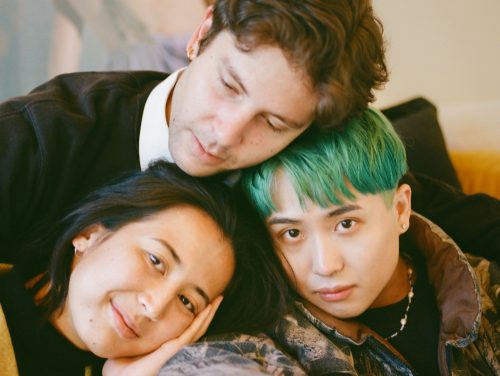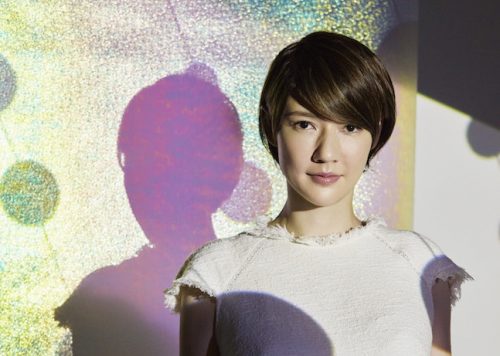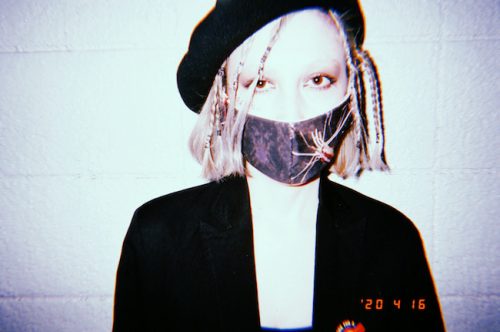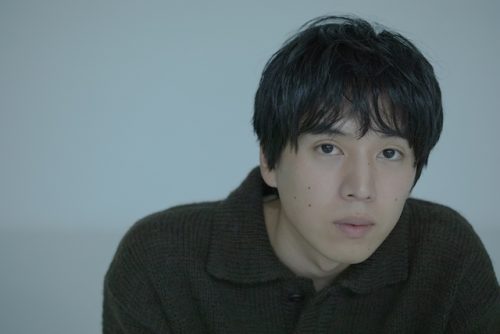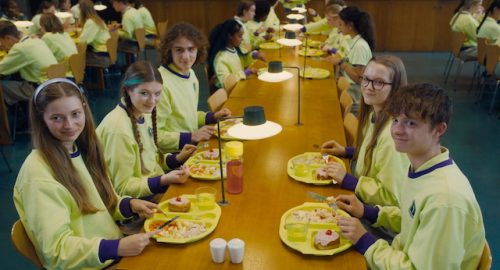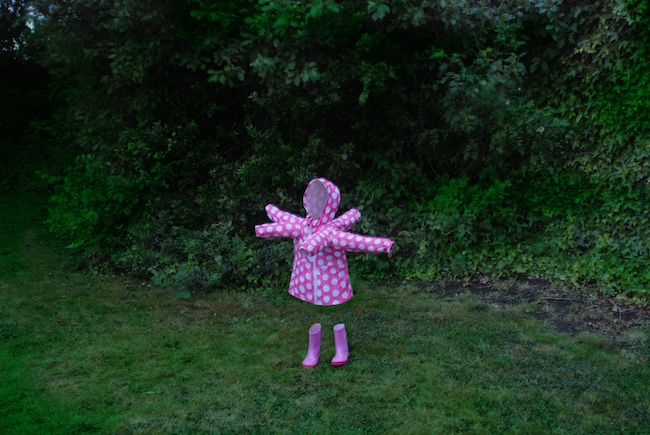
Shared Baby (2011) ©️Ai Hasegawa
“Shared Baby” portrays a child that holds genes from more than three biological parents. Taking a DNA sample from an existing same-sex couple and predicting how the child will look and will behave, a ‘family photo’ was taken. Like “(Im)possible Baby , Case 01 : Asako & Moriga” , utilising the power of biology, Ai Hasegawa continues to depict and showcase a realistically possible near future in her artwork, covering debates that lie in our society and our reality such as the future that is entailed from our desires and the broadening spectrum of options we are exposed to. Taking inspiration from her own desires and ideas and finding intersections with them between science, many of her works question traditional family structures and reproduction. Making comparisons between the situations we face today, we asked her for her opinions.
―― In a talk event that was held before about “Human X Shark ” ( a project held in collaboration with Shiseido that was conducted in 2017 which portrays a strong woman trying to lure the sharks with a signature scent.) you spilled the story behind the project. Within that story I vividly remember you talking about how you were fed up with dating men in Japan so you were now trying to attract sharks instead. Your projects are usually related to the fields of biology, which in a way comes across as very complex but in every project you seem to add a human touch to them that makes it very easy to relate. I think that is incredible.
Ai Hasegawa : Thank you. The purpose for making my projects comes always from internal thoughts. ‘Shared Baby’ ( the shifting family structures caused by innovation in technology and progression in society, and a workshop, photo, product design and diagram to think about the relations. From a woman who had a problem in her mitochondrial DNA, a child was born with the genes from three parents. In the field of in vitro gametogenesis (IVG) in the future, it was proposed that it will be possible for a child to hold genes from three , four or even a numerous number of parents in 2011). With the feeling of giving up and questioning a family that was made from a one on one relationships, and having a conversation about wanting to raise a child with the best people possible without having any romantic interest towards them, this project blossomed from my own desires. In(Im)possible Baby , Case 01 : Asako & Moriga( Taking a DNA sample from an existing same-sex couple and predicting how the child will look and will behave, a ‘family photo’ was taken. It is said that this will be possible in the future thanks to iPS cells. )Technologically and ethically, this child is still impossible. However, taking into consideration genetical data, same sex couples will be able to have a baby. On the easier web simulator, if you upload the couples 23 and me genetical data, it will randomly put together a simulation about the likeliness of the child getting ill, their appearance and information about their personality and be printed in text. Won Excellence Award at Work Art Division in 19th Japan Media Arts Festival. 2015) And this all started from a conversation I had with a friend.
Regarding Human X Shark, relationship engineering is really in trend at the moment. When looking for a relationship I feel like men are looking at women, not as a human being but more like prey. The swipe right aspect of dating apps just adds on to that frenzy. A partner should be someone who is crucial to your life but now it’s starting to seem as if a replacement can be found very easily. According to an experiment held by a psychologist called Susan Phynx, when a man looks at a woman in a bikini, some of the men’s brains react the same way as when they see a tool and the part of the brain that invokes relation doesn’t react for some men. Some studies suggest that some men think of a sexy female as a commodity. On top of having a prey and hunter like hierarchy system, I believe that dogs who are allowed to increase their Oxytocin levels will betray you less than humans and you will be able to connect to them from your inner self. This made me remember reading about a person who had sexual intercourse with a dolphin. He said that he was doing it with a approx. sixty centimeter size dolphin that could run away if he did not have mutual feelings towards him. So he believes that he has consent. I agreed to some extent and I thought the written piece was very romantic and that the intimacy between the man and the dolphin was very sacred. On the other hand distance between men and women seem to be spreading farther and farther apart. I feel like the distance between men I have right now is the same of a shark not too far as to say an alien. (laughs) I have always been a shark lover and that is how the project about giving birth to a dolphin was born (“ I wanna deliver a Dolphin, I wanna deliver a Shark” . With the intention of not overflowing the world with more people which is already overpopulated with 70 billion people with decreasing rates of absolute food to feed them , I suggested that we give a surrogate birth to breeds that are reaching extinction ( Sharks, Tuna and Dolphins) and this was proposed during 2011 -2013). Some people think I am bizarre for creating these sorts of projects but I have solid logic and reason behind them.
Human X Shark from aikiaiki on Vimeo.
―― What started your interest in biology?
Ai Hasegawa : I remember that my family was a part of a religious sect and I felt a slight awkwardness towards it. Once I finished high school and started living by myself, I finally ended my relationship with that sect. Religion is in a way very ‘handy’. For example, if you ponder about what will happen when we die, we can fall back on the presence of heaven and feel a sense of relief from this fantasy that the religious sect has created. I, on the other hand decided to end my relationship with anything regarding this way of living. I lost my classmate due to cancer who was 21 at the time and I had to cope with the sorrow that came with him passing away by creating another fantasy of mine completely unrelated to religion. This is when science came into play. I created my own fantasy with the wisdom from science. Due to technological advancements, science has a possibility to intersect with reality and so my fairytale was more rational in a sense that it was not completely separated from the real world. However, the right knowledge and bioethics has to be kept up to speed in correlation to the advancement of technology. I think this everyday.
―― Could you give us some specific examples of this?
Ai Hasegawa : People taking reproductive medicine and the dangers regarding bioethics in Japan was a hot topic recently. For example, in Japan and in the UK, unmarried women are allowed to freeze their eggs for preservation. Regardless of the fact that 90 countries including the UK now stock emergency contraceptives in local pharmacy’s, in Japan you still need to go to the hospital and get a prescription to get you hands on contraceptives. That means young girls in Japan who have been raped have to tell their mothers what happened, bring their health insurance to the hospital and have to confess to them what had happened to finally get their hands on medication. The road that has to be taken to get you hands on something that is a absolute right for us women is far too long. In Japan, people assume that if such contraceptives are easily accessible, it will lead to more people misusing them. I believe that when sexual desire interferes, we tend to lose our purpose. When we lose our self control over things, I believe that we should be able to cope by utilising our knowledge and our intelligence. If less people are likely to get hurt, then we should be able to gradually shift to think in such a way. There is a possibility of misuse towards all technology in the world and if someone is misusing it we should educate them with the right way to use it. It is also essential for the person to be in an environment where that sort of knowledge is accessible. Even for a person like me who likes to research about these topics due to interest, it took me years to learn the right information regarding low dose pills and contraceptives. I feel like education about sex or sex related topics in Japan is just lagging really behind.
―― Not many parents educate their kids about sex in their households either.
Ai Hasegawa : Exactly. I was not given education regarding that topic in my household either. I did have an older sibling who was two years older than me so I was able to learn about periods, but I learnt about tampons and how to use them from my friends sister. Now, there are not just napkins and tampons but period cups that are available online and the world is slowly changing for the better. But even as a person who has had her period for years, I still don’t know the best way to deal with them when they come every month. Depending on our body, period pains vary so opinions tend to clash towards that topic too. I think that feminism and its very sluggish progress in Japan has something to do with this actually. Even if you are talking about the same topic and experiencing the same pain, it really just comes down to the difference in opinions. Some people fall into this no pain no gain theory in such case they think ‘If you can’t endure that much pain, then you aren’t trying hard enough..’ Men on the other hand can’t even imagine how painful period cramps are so everyone is different individually so it is really important to be given the right knowledge.
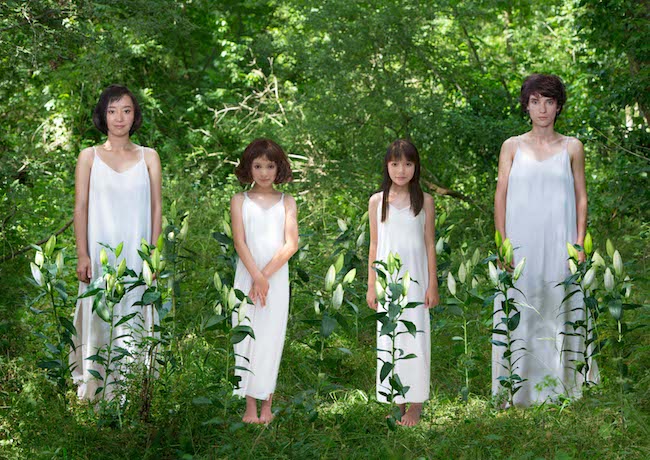
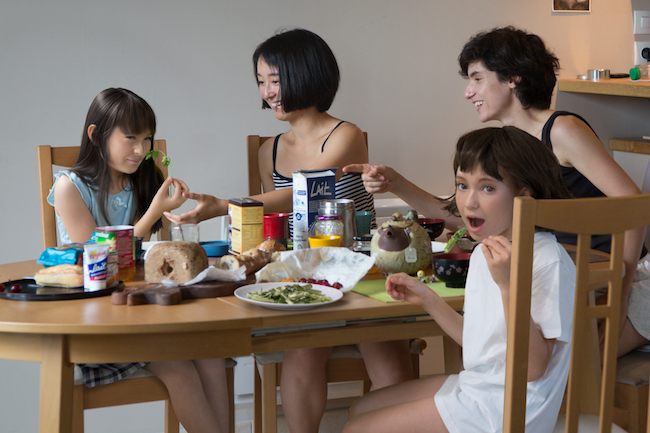
(Im)possible Baby , Case 01 : Asako & Moriga (2015)©️Ai Hasegawa
―― This month’s issue is about our bodies, and what invoked this was the ban on abortion that was passed in Alabama. How do you, personally feel about this bill being passed?
Ai Hasegawa : I thought that it was unbelievable. Maybe this is a tactic on how to keep the DNA of those raped for the next generation. The risk of having a child is less for a man. On the other hand for a women, they are basically risking their lives and it is an absolute right for these women to have have the freedom to choose what to do. Men constantly claim that they want to leave and scatter their DNAs. But it so, they can just register themselves to a sperm bank and that would be way more productive. So the purpose is not the problem here. You have a solid confidence towards yourself and your values and there is this urge to rub it into other people’s faces. On the other hand, this sort of backlash happens all of the time. For the people who want to tie the knot and want to have a baby, this sort of society will enable them to make their wishes come true. Anti Aging for eggs, and a new way to ovulate outside of the body is currently being tested but still needs some final touches to be implemented. So I also do understand when people say that the fastest way to give birth to a child would be to go to past environments from a century back.
―― That is very interesting. I never thought of it like that. However that is one option and having no option is not a very desirable situation either.
Ai Hasegawa : Yes, there needs to be a security for diversity and I am hoping that my project will lead to a broader range of selection for the future. Also when we are faced with such problems, it is difficult to know how to express it from a feminist’s approach. For example, if there are people who write comments such as ‘women’s rights are weak’ or ‘there are people who fall ill when they are on their period’, some people will directly accept that as the reason for why women are inferior to men. There are some people who say that women aren’t good at work because they have periods but that is different to human rights. What we take into consideration when we set values to our abilities. Sometimes I think those standards for those values are decided from a very male orientated perspective. However, some people who are anti-feminists are soaking up the facts wrong so I personally would like to approach this with an enlightenment to the grey areas.
Recently, I was fascinated by a person who came up to me and said ‘ my gender is wavering and my identity is changing.’ I realized then and there that identity is something that is fluid too. Women’s hormone balances change constantly depending on their menstrual cycle and in a way I am used to observing my mental state from an audience’s perspective but for men these experience may be less frequent and therefore they might not be used to it and have less of a spectrum. For now, I believe that I am a hetero sexual but it might change in the future. I know that my gender is fluid from experience and I used to dress like a boy for a long period of time and now I dress more feminine and I believe that to be a form of cross dressing. I have come to the point where I now believe that ‘like a woman’ is more of a concept for me. I heard from a person that is MtoF (meaning man to female: transgender) that they drink steroids, wear women’s clothes and learns how to act like a woman. I thought my breasts would grow big when I became an adult but when I finally did they didn’t grow as much as I had expected. I had a desire for them to look bigger so I chose outfits that would make me look more feminine and I realized that that is what it means to become ‘a woman’. I think role models for woman in Japan are trying to adjust and be the type of woman that a man most desires in our society. If you step back from such a culture and live in nature, maybe we won’t need to feel as if we have to meet the desires of Japanese men in our society? I sometimes feel that way.
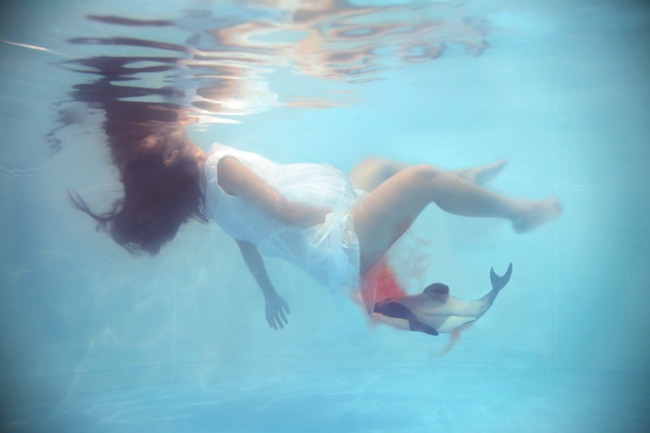
I Wanna Deliver a Dolphin…(2011-2013) ©️Ai Hasegawa
―― In Japan, so much pressure is imposed on the women.
Ai Hasegawa : My family had a strong view of how women should be and act and my mother was also the ideal housewife so I am grateful for the self sacrifices that she made and I thought that was our duty. When you are surrounded by that sort of environment, unless you develop a strong will to change, you can’t escape from it. It is engraved in you. People sometimes say that because of this engravement, girls hold an imaginary baby in themselves from a very young age. The thought of giving birth, lingers in your head even when you are job hunting. In our Japanese society, it is increasingly becoming difficult to raise a child and nurture it. When you give birth at a young age, it will be hard to work but if you give birth when you are older there are more risks involved. That’s why I think that freezing your eggs is one solution. It will not guarantee you a child in the future but you can rely on it more like an insurance. However there are people who are tied to the beliefs of nepotism and some who are anti- bornists and believe that giving birth is ethically wrong. I want more people to see that there is no one way of living.
Yesterday, I was given the opportunity to watch a VR adult video on DMM. When I experienced the video for men, I was so intrigued when I looked down at myself in front of the woman and I had the body of a man. If I can now have part of the male genitalia thanks to this technology, I feel like I can go both ways. If I were to ever quit being an artist, I want to invent something in regards to that (laughs). This varies depending on your beliefs, but I believe in gender fluidity.
I Wanna Deliver a … from aikiaiki on Vimeo.
――Due to technological advancement, so much has changed in regards to gender and giving birth. Even the average life span is becoming longer. I think you have an interest in aging too, am I right?
Ai Hasegawa : I developed an interest due to personal experiences. My grandfather has lived up to a hundred years old, but behind this there is 20 years or hard labor from my mother that was involved on making this happen. So I can’t completely say that living longer is always the right way to go. Because euthanasia is taboo in Japan, on contrary a sort of ‘death harassment’ may develop, when someone harasses a person by saying ‘ you should die soon’. But then I feel like being taken care by from a relative or another person for an extended period of time is exploitation in a way if there is no fairness to it. Before, we could leave the world in a positive note because we believed in the world beyond where there is heaven but it doesn’t seem to play out that simple nowadays. In a way, we have to change our perspectives towards life but there doesn’t seem to be a concrete way to do that right now. However I found an answer to this question in a science fiction series.I found out by watching black mirror. We can upload a digital copy of ourselves and send it to heaven. For the people who are physically incapable or people who don’t want to live in their hosts anymore, they just have to upload their conscious to ‘ a heaven created by technology.’ and you will be able to live in there. Without this, it will just be a battle between ethics so. On the topic of reproductive ethics it is important to question where the line is drawn and to what extent is reproductive ethics? What is medicine, if it is medically approved is it plausible. Is it unnatural to cure a disease caused from nature with medicine? When you take such questions into consideration we have to debate about what we see as medicine and what we see as death. I believe that if I am no longer able to look after myself, my presence has passed away according to what animals consider as death to be. However it is too aggressive if I push everyone into thinking this way. What people will think about the exploitation of others is another topic that will debated about on par with what human appreciation means.
――So the topic about the intersections between reproductive rights and technology will be debated on soon, I’m guessing.
Ai Hasegawa : In the example above, the ethics behind leaving your conscious in digital form in a digital space will rise as a topic. Not only reproductive rights but president Donald Trump is conducting something on social media which I like to call ‘ a digital nudge’ in where people are manipulating people’s thoughts in a very subtle manner. There are things that are considered good and bad in technology. I believe that without asking ourselves why it is good or why it is bad, and not looking at it from different angles and stopping to see the big picture, it is important to debate and implementing the best policy possible to approach the situation in a cunningly manner.
――Lastly, technology allows us to exaggerate, but you continue to be true to yourself and to your work. As you continue to release new material, what kind of a world do you anticipate for the upcoming generation?
Ai Hasegawa : I hope the act of exploiting others will stop. It is important to not spread negativity to those around you. I recently learnt that this way of thinking is called ‘negative utilitarianism’ . In contrast to Bentham’s utilitarianism which focuses on how to get maximum happiness and wellbeing, negative utilitarianism focuses on minimizing pain and believes that this way of thinking is more important ethically. Saying this, this relates to animal rights and I believe that this will lead to my pleasure decreasing so I just hope that artificial meat will be sold in the mainstream market soon.
I feel like the people thinking about how to use technology are always capitalist men. So I want an alternative way of thinking to rise soon. I believe that the amount of people who have desires and how to implement them will shift our future completely, so I would like to know the desires of the younger generation of today. I want more opportunities to really deep dive into the desires that people have that haven’t yet become reality. I believe that that will lead to making our future. I made my projects with a positive note, however some may come across it as a dystopia. I want to utilise the power of perception more wisely and see the world in a different light if possible.
Ai Hasegawa
Artist and designer. Ai Hasegawa produced many works putting emphasis on subjects relating to technology and people with employing techniques such as Bio Art, Speculative Design and Design Fiction. She obtained degree of MA in 2012 from Design Interactions Course, Royal College of Art in Britain; worked as researcher at Design Fiction Group, MIT Media Lab from 2014 to fall of 2016; took degree of MS in 2016; serving as Project Researcher at The University of Tokyo since April 2017 ; won Excellence Award at Work Art Division in 19th Japan Media Arts Festival for her work titled “(Im)possible Baby, Case 01: Asako & Moriga”; hold exhibitions within and outside Japan including at MORI ART MUSEUM and Ars Electronica.
Exhibited at “Mind Temple” MoCA Shanghai, Ars Electronica “RADICAL ATOMS” 2016, National museum Design in Kulturhuset Stadsteatern Sweden, Milano Salone Italiy, Science Gallery Dublin , Taipei Digital Arts Center and so on.
https://aihasegawa.info
text Ryoko Kuwahara




